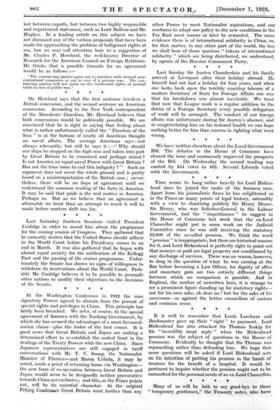Mr. Howland says that the first sentence involves a British
concession, and the second sentence an American concession. According to the New York correspondent of the Manchester Guardian, Mr. Howland believes that both concessions would be politically possible. We are convinced that he is right in saying that feeling about what is rather unfortunately called the " Freedom of the Seas " is at the bottom of nearly all American thought on naval affairs. The average American says—not always relevantly, but still he says it :—" Why should our ships be stopped on the high seas and taken into port by Great Britain to be examined and perhaps seized ? Is not America an equal naval Power with Great Britain ? Has not the time come to end this indignity ? " Such an argument does not cover the whole ground and is partly based on a misinterpretation of the British case ; never- theless, there will be no hope of agreement until we understand the common reading of the facts in America. It may be said that pride is the real motive in America. Perhaps so. But as we believe that an agreement is attainable we trust than an attempt to reach it will be made before matters drift too far.
* * * *








































 Previous page
Previous page